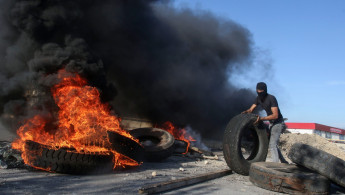Protests in Lebanon enter fifth day as currency plummets
The Lebanese pound fell in value to a new low of 10,000 to the dollar on Tuesday, triggering a rapid increase in prices that few can afford to pay, as well as more power cuts across the country due to delays in the arrival of fuel shipments.
As the caretaker Prime Minister Hassan Diab threatened to halt his duties to persuade politicians to form a government, Lebanese people blocked roads, set fire to tyres, and joined together in frustration.
"The dollar is 10,500 [pounds] and everyone has four or five children on their neck, including their parents. They (corrupt politicians) need to feed us," said one protester to Al Jazeera.
In Beirut, crowds gathered in front of the banking association to call for access to their deposits, before taking their frustrations to the parliament building.
"We want parliamentary elections," said a woman to TV channel Al-Jadeed.
"We want all 118 MPs to resign now... We need to remove the legitimacy of the ruling class."
Twitter Post
|
Anger also overtook the streets of Lebanon's poorest city, Tripoli, where people blocked multiple roads, organised a sit-in near the city’s port, and demanded the resignation of the political class, according to reports from the official National News Agency.
The pound had been pegged to the dollar at 1,500 since 1997, but the country's worst economic crisis since the 1975-1990 civil war has seen its unofficial value plummet.
Lebanon's Al-Akhbar newspaper said on Tuesday that the currency plunge was partly the result of commercial banks sucking dollars out of the market to meet the capital demands of the central bank.
The slide in the value of the pound has led to soaring food prices in a country where more than half of the population now lives below the poverty line.
Lebanon has been without a fully functioning government since outgoing premier Hassan Diab resigned in the wake of a devastating explosion in Beirut port last year.
The blast killed more than 200 people and piled new misery on a country already brought to its knees by the economic crisis.
Lebanon was rocked by mass protests in 2019 against a political class deemed inept and corrupt, but those demonstrations largely petered out after the coronavirus pandemic arrived in the country.
Agencies contributed to this report.
Follow us on Facebook, Twitter and Instagram to stay connected





 Follow the Middle East's top stories in English at The New Arab on Google News
Follow the Middle East's top stories in English at The New Arab on Google News
![Both Hamas and the Palestinian Authority welcomed the ICC arrest warrants [Getty]](/sites/default/files/styles/image_330x185/public/2024-11/GettyImages-2178351173.jpg?h=199d8c1f&itok=TV858iVg)

